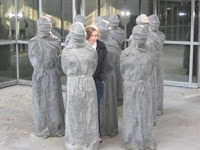Typhoon Haiyan Devastates the Philippines
Monday, 11 November 2013
Pax Dei--Living in Peace 3
Typhoon Haiyan Devastates the Philippines
Wednesday, 21 May 2008
Member Care and Human Rights--4

Have a seat, and have a think with me:
Life maims and we moan.
How do human rights abuses relate to these maims and moans?
How does member care help to alleviate them?
*****
Note--I am still thinking...This topic is way too big for me!
Human dysfunction is part of the maiming/moaning reality. It includes things like deception, addictions, denial, shifting blame, and human rights abuses including violations of people’s consciences and religious liberties, murder, rape, and economic servitude. All of these areas and more can affect mission aid workers as they interact with colleagues and the people that receive their services.
The source of dysfunction from a Christian perspective relates directly to something tragic that happened between God and humans. Something horrible interfered with their relationship, as related in the Genesis narrative, influenced by humans and fallen angels alike. Humans became ontologically, morally and socially fragmented, beset with the intractable flaws of self-centeredness, self-deception, and self-depreciation. We deny who we really are and try to be something we are not. We do things to benefit ourselves at another’s expense. In spite of our moral goodness and beauty—having been made in God's image—we are all guilty of “crimes against ourselves and crimes against humanity”. The pernicious combination of human and devilish wrongs leads to a demise of our well-being with the maiming of our rights and the moaning for our rights.
Let’s look again of the Universal Declaration of Human Rights (UDHR). I want to use a few terms from the Preamble (in caps below) to express three types of problems that ensue when our human rights get overlooked.
There are problems when we do not RECOGNISE the reality that humans have dignity and rights. Certain people (especially those we don't like) can be viewed as being less human and thus merit human wrongs and not merit universal human rights. Hence it is OK to hurt or neglect people and to excuse it or even not be “aware” of it. This denial and distortion of human reality is reflected in Jeremiah 17:9: “The heart is more deceitful than all else and is desperately sick. Who can understand it?”
There are problems when we do not REGARD the dignity and rights of humans. This distortion of reality leads to controlling and exploiting others. Freedom of speech, of conscience, and of religion, at the state level for example, are the first to be repressed. At the family, group, or organisatinal levels, the maladaptive trio of ‘Don’t talk, don’t feel, don’t trust” becomes pervasive. At the individual level it is all about staying safe and pretending, not disturbing the status quo, and not jeopardising ones position. Fear reigns and leads to blind loyalty, self-protection, poor practice, low morale, and group stagnation. But we do all these things at the cost of our dignity and of our rights (and responsibiliity!) to respond to reality authentically.
Article 29 of the UDHR says that “Everyone has duties to the community…” It is this sense of duty that makes us want to RECOGNISE, REGARD, and PROMOTE the rights and well being of others. This duty is synonymous with our sense of “moral obligation" or what Kant referred to as the “categorical imperative”. Underlying the notion of human rights then is the reality of moral law.
*

Tuesday, 19 February 2008
Member Care and Beauty

Reflection and Discussion
Today, find--or hunt for if necessary--
something truly beautiful. It helps put problems into perspective.
Monday, 11 February 2008
Member Care and Beauty
Not too long ago we were walking through Ards Friary, one of our favourite places on the planet. This Franciscan community is located on the wildly gorgeous Donegal coastline in northwestern Ireland. We were overwhelmed by the beauty of nature. It is easy to understand why this lovely peninsula was chosen by the Franciscans to locate their friary. Here is a photo of the area surrounding the friary. We wish you could also experience the crisp air of late Spring, the intermingling fragrances of sea salt and flower blossoms, and the majestic sounds of the distant waves as they gracefully curled onto meticuloulsy white strands.

** What are some of your favourite places on earth?
**What are some aspects of nature in particular that renew you?
**How could sending groups incorporate “sustainable, multi-sensorial experiences of nature" into their member care approaches?
**Would you like to do anything today to connect with beauty in creation?